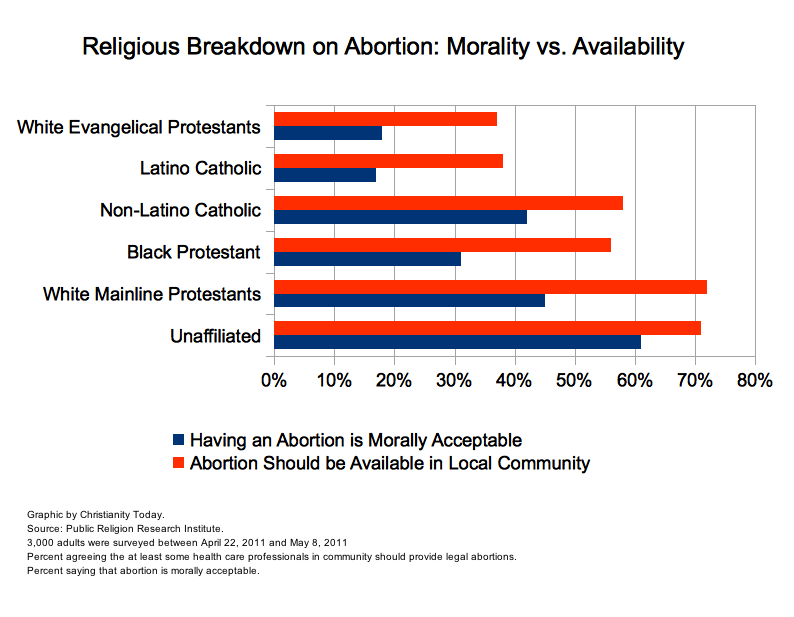People tend describe themselves as either pro-life or pro-choice. But a new poll by the Public Religion Research Institute (PRRI) shows that the average American still holds conflicting views on abortion nearly 40 years after Roe v. Wade. Evangelicals remain much more opposed to abortion than other Americans, but they, too, often do not fit neatly into pro-life or pro-choice camps.
PRRI Research Director Daniel Cox said, “For some time now, Americans have held a stable tension between two views: majorities both say that abortion is morally wrong and say that it should be legal in all or most cases. The binary ‘pro-life’ and ‘pro-choice’ labels don’t reflect this complexity.”
On the poll’s simplest, straightforward abortion question, a majority said abortion should be legal. PRRI found only four-in-ten said abortion should be illegal. However, few took a consistently pro-life or pro-choice position. Only 19 percent said abortion should be legal in all circumstances; 14 percent said it should be always be illegal. That leaves nearly two-thirds approving abortion in some cases but not in others. These results a similar to those by the Pew Research Center for the People and the Press. A similar question by Gallup finds fewer in the middle category, but overall the pattern is the same: most Americans approve of abortion in some, but not all, circumstances.
Among religious groups, white evangelicals stand out as being against abortion. Less than one-third (29 percent) said abortion should be legal; two-thirds believe it should be illegal. Support for the legality of abortion is much higher among other Protestants and Catholics.
This, however, is only part of the story. When asked abortion should be available to women in their community, 37 percent of evangelicals agreed. A majority of non-Latino Catholics and black Protestants said abortion should be available. Over 70 percent of Mainline Protestants and those unaffiliated with religion took this view.

This week on The Bulletin, hosts Mike Cosper, Nicole Martin, and Russell Moore are joined by The Dispatch columnist Mona Charen for a New Hampshire primary postmortem. The quartet discuss Nikki Haley’s viability, Trump’s domination at the polls, and what America needs as it moves toward the general election. Next, Mike, Nicole, and Russell deep-dive into TikTok and find an AI Jesus who promises to fulfill our deepest longings, prompting the question, Is our understanding of faith too transactional? Finally, this week marked the 100th anniversary of Vladimir Lenin’s death. If the dead still speak, what can they say about our present moment?
Subscribe to Christianity Today.
Resources Referenced:
The Kingdom, the Power, and the Glory: American Evangelicals in an Age of Extremism by Tim Alberta
“A TikTok Jesus promises divine blessings and many worldly comforts” by Brandon Dean
“The Bulletin” is a production of Christianity Today
Executive Producer: Erik Petrik
Producers: Clarissa Moll and Matt Stevens
Associate Producer: McKenzie Hill
Editing and Mix: TJ Hester
Music: Dan Phelps
Show Design: Bryan Todd
Graphic Design: Amy Jones
Social Media: Kate Lucky
Support for the availability of abortion does not mean that abortion is seen as morally neutral. Among all religious groups, a majority of adherents believe that abortion is morally wrong. Among evangelicals, less than one-in-five said abortion is morally acceptable. This finding is consistent with surveys by Gallup over the past decade. In most years, a majority of Americans say that abortion is morally wrong while around 40 percent say it is morally acceptable.
With such conflicting attitudes—abortion is immoral but should be acceptable—many Americans are uneasy being labeled as either pro-life or pro-choice. Most Americans said that “pro-choice” described them somewhat or very well (70 percent). At the same time, nearly the same percentage said the same about being “pro-life” (66 percent). This overlap between those who feel comfortable with pro-choice and pro-life labels exists among all major demographic groups.
Among evangelicals, 80 percent said “pro-life” described them well, but nearly half (48 percent) said the same about being “pro-choice.”
The poll shows that Americans advocate abortion laws that are, at best, contradictory. The poll finds that on the one hand the public supports abortions laws that protect the fetus throughout the entire pregnancy (63%) and encourage women to make more responsible decisions (78%), but on the other hand, they also want laws that preserve a woman’s freedom to make her own decisions (70%).
The consistently pro-life and pro-choice people are in the minority. A majority of Americans said women should be allowed to have an abortion if her health was endangered, the victim of a rape, or if there is a chance of the child being born with a serious birth defect. However, support drops if the woman is getting the abortion because she is in poverty or if she does not want to marry the father.
With most Americans ambivalent on abortion, it is not surprising that 40 percent said that abortion is not an important issue (compare that to 3 percent who say the economy is not important). But there remains 29 percent who say it is a “critical” issue. And with these voters likely to hold stronger, and more consistent, views on abortion, the fight between pro-life and pro-choice activists is likely to continue despite the ambivalence felt among most Americans.
Editor’s Note: The PRRI poll was conducted between April 22 and May 8. 3,000 adults living in the continental U.S. were surveyed. The poll has a margin of error of +/- 2.0 percent. The margin of error for white evangelicals is +/- 3.5 percent. For complete survey details see the PRRI report.








